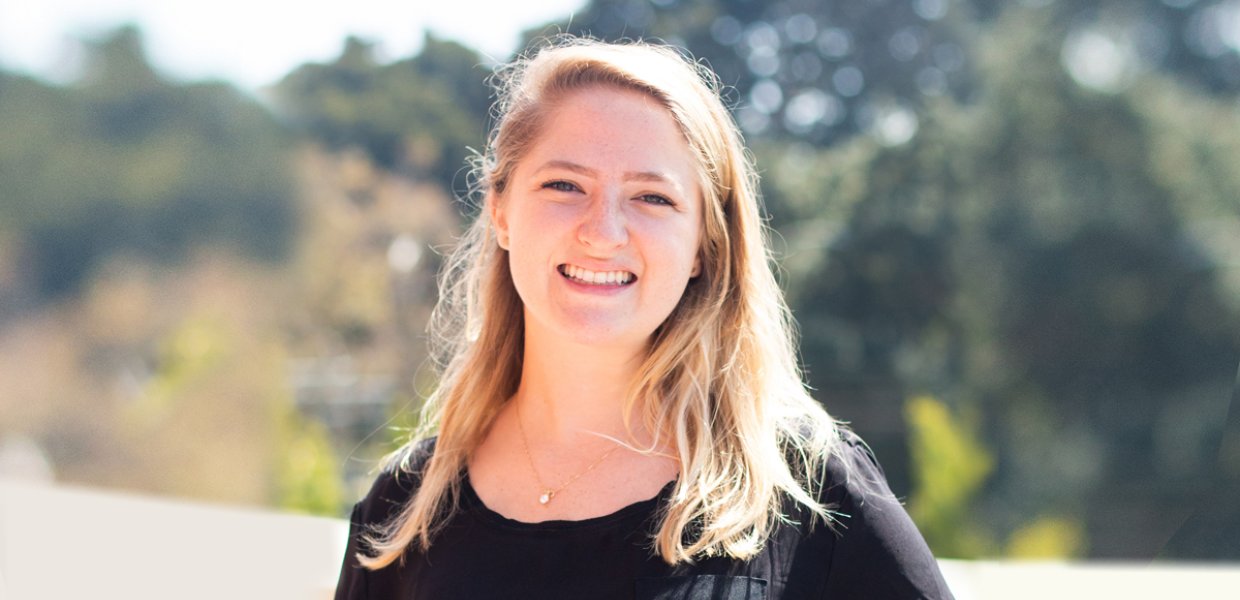“I try to learn something new every day,” said alumna Hannah Hunter. “I like to think of things in the big picture — as big a picture as possible.”
Now a public relations associate with KARV Communications, a small PR firm in New York City, Hunter has been broadening her horizons from an early age. The Michigan native grew up outside Flint, and fondly recalls the trips she took in her childhood — to Germany for the 2006 World Cup, and to Italy to see the Colosseum — that gave her a taste of the vastness of the world.
During her undergraduate years at Michigan State University, Hunter studied comparative cultures, politics and French. That background set her up for an even bigger leap in the wider world: In 2018, she enrolled in the dual master’s degree program in global communication at USC Annenberg and the London School of Economics.
“Having the value of intercultural communication, I was thrilled to be in a master’s program with people from all kinds of countries, from different experiences across the world,” said Hunter, who completed the program in 2020.
Hunter spoke with USC Annenberg about how her degrees have equipped her for her current professional role — and for whatever comes next.
What distinguished this master’s program from others you were looking into?
On a personal level, you’re getting to interact with people who have diverse experiences and learning the nuances of intercultural communication. On an academic level, you’re taking a fine-tooth comb to communication theoretically and learning how to research it on your own.
It was a great opportunity to learn both in and out of the classroom. The program is unique in that way, because you’re out there in the real world and experiencing how people actually communicate across cultures. Even just the act of going to school exposes you to the impact of global communications, which is really important when you read these very intense studies about how people communicate.
How much of an impact did the COVID-19 pandemic have on your studies?
Thankfully, the pandemic began during my last semester at USC, so I was still able to experience how London and Los Angeles are such major cultural hubs. New York City, where I work now, is just another experience like that. I’m able to meet all people from all kinds of industries from all over the world.
How do your master’s degrees factor into the work you’re doing now?
Global communication taught me the importance of assessing issues from a big-picture perspective and how to understand differing viewpoints on an issue, and then research those viewpoints to help you form your own opinion. And also more importantly, to be able to articulate that opinion or idea in a concise and informed way. The program also prepares you to talk to people in differing industries and the importance of being able to communicate across multiple vernaculars.
It [the degree] fits really well in the PR field because sometimes we have crisis situations where we have to help a business develop the right message. You have to be able to understand the nuances of what this international company stands for, the message they represent, and then translate that across cultures. I think there’s a growing space in public relations for people who study global communication.
What is your most important takeaway from the dual master’s program?
While both USC and LSE are rigorous academic environments, you’re also meeting people who are all in the same boat as you and just trying to do their best — but who are also willing to go to the pub after class and have a pint of beer. That time in London was an incredible experience for me, because I felt like I was experiencing the U.K. culture while learning so much and getting to know people that I remain friends with today — and probably will be friends with for the rest of my life. In both places, the opportunity to build friendships is really incredible.
